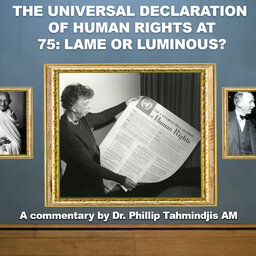Twentieth Century Impulses towards a Universal Declaration
While the 19th century had seen some advances in rights for people (the abolition of the slave trade; protection of people in times of war), they were advances for specific groups of people rather than for all human beings.
At the start of the 20th century there were several organisations from many parts of the world which were concerned about rights. These were the initiatives of concerned
individuals rather than governments.
After the devastation of World War I, a truly inter-governmental organisation was set up: the League of Nations. It achieved several advances for rights, such as for minorities and workers, but again the focus was on specific groups rather than for everyone universally. Also, the fact that the United States never became a member of the League was a distinct drawback in its effectiveness.
After the Second World War, advances in technology meant that people all over the world could see in newsreels the horrors perpetrated by totalitarianism. This helped change the international mood to one in favour of rights for everyone. But when the United Nations was established its Charter contained references to human rights but no definition of them.
The major powers with veto power in the Security Council were more concerned about world peace and stability than human rights. But the General Assembly had the power to discuss any matter under the UN Charter and recommend action.
The seeds had been sewn for the development of human rights – but again the principal instigators and drivers of this were committed individuals, rather than governments, who would help bring about a social and legal phenomenon.
 THE UNIVERSAL DECLARATION OF HUMAN RIGHTS AT 75: LAME OR LUMINOUS?
THE UNIVERSAL DECLARATION OF HUMAN RIGHTS AT 75: LAME OR LUMINOUS?


